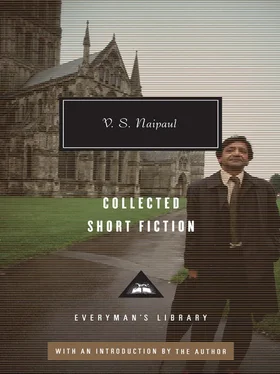It was no pleasure to me to note that during those ten years the boy Hori had been prospering. He had gone into the trucking business and he had done remarkably well. He had bought a second truck, then a third, and it seemed that to his success there could be no limit, while my own was always restricted to the predictable contents of the brown-paper pay-packet at the end of the month. The clothes in which I had taken such pride at first became less resplendent, until I felt it as a disgrace to go to church in them. But it became clear to me that this was yet another of the trials I was called upon to undergo, and I endured it, until I almost took pleasure in the darns on my sleeves and elbows.
At this time I was invited to the wedding of Hori’s son, Kedar. They marry young, these people! It was an occasion which surmounted religious differences, and it was a distinct pleasure to me to be again with the family, for their attitude had changed. They had become reconciled to my Presbyterianism and indeed treated me with respect for my profession, a respect which, I fear, was sometimes missing in the attitude of my superiors and even my pupils. The marriage rites distressed me. The makeshift though beautiful tent, the coconut-palm arches hung with clusters of fruit, the use of things like mango leaves and grass and saffron, the sacrificial fire, all these things filled me with shame rather than delight. But the rites were only a small part of the celebrations. There was much good food, strictly vegetarian but somehow extremely tempting; and after a period of distaste for Indian food, I had come back to it again. The food, I say, was rich. The music and the dancers were thrilling. The tent and the illuminations had a charm which not even our school hall had on concert nights, though the marriage ceremony did not of course have the grace and dignity of those conducted, as proper marriages should be, in a church.
Kedar received a fabulous dowry, and his bride, of whose face I had just a glimpse when her silk veil was parted, was indeed beautiful. But such beauty has always appeared to me skin deep. Beauty in women is a disturbing thing. But beyond the beauty it is always necessary to look for the greater qualities of manners and — a thing I always remind Winston of — no one is too young or too old to learn — manners and ways . She was beautiful. It was sad to think of her joined to Kedar for life, but she was perhaps fitted for nothing else. No need to speak of the resplendent regalia of Kedar himself: his turban, the crown with tassels and pendant glass, his richly embroidered silk jacket, and all those other adornments which for that night concealed so well the truck-driver that he was.
I left the wedding profoundly saddened. I could not help reflecting on my own position and contrasting it with Hori’s or even Kedar’s. I was now over forty, and marriage, which in the normal way would have come to me at the age of twenty or thereabouts, was still far from me. This was my own fault. Arranged marriages like Kedar’s had no part in my scheme of things. I wished to marry, as the person says in The Vicar of Wakefield , someone who had qualities that would wear well. My choice was severely restricted. I wished to marry a Presbyterian lady who was intelligent, well brought up and educated, and wished to marry me. This last condition, alas, I could find few willing to fulfil. And indeed I had little to offer. Among Hindus it would have been otherwise. There might have been men of substance who would have been willing to marry their daughters to a teacher, to acquire respectability and the glamour of a learned profession. Such a position has its strains, of course, for it means that the daughter remains, as it were, subject to her family; but the position is not without its charms.
You might imagine — and you would be correct — that at this time my faith was undergoing its severest strain. How often I was on the point of reneging I shudder to tell. I felt myself about to yield; I stiffened in my devotions and prayers. I reflected on the worthlessness of worldly things, but this was a reflection I found few to share. I might add here, in parenthesis and without vanity, that I had had several offers from the fathers of unconverted daughters, whose only condition was the one, about my religion, which I could not accept; for my previous caste had made me acceptable to many.
In this situation of doubt, of nightly wrestling with God, an expression whose meaning I came only then fully to understand, my fortune changed. I was appointed a headmaster. Now I can speak! How many people know of the tribulations, the pettiness, the intrigue which schoolteachers have to undergo to obtain such promotion? Such jockeying, such jealousy, such ill-will comes into play. What can I say of the advances one has to make, the rebuffs one has to suffer in silence, the waiting, the undoing of the unworthy who seek to push themselves forward for positions which they are ill-qualified to fill but which, by glibness and all the outward shows of respectability and efficiency and piety, they manage to persuade our superiors that they alone can fill? I too had my adversaries. My chief rival — but let him rest in peace! I am, I trust, a Christian, and will do no man the injustice of imagining him to persist in error even after we have left this vale of tears.
In my fortune, so opportune, I saw the hand of God. I speak in all earnestness. For without this I would surely have lapsed into the ways of darkness, for who among us can so steel himself as to resist temptation for all time? In my gratitude I applied myself with renewed dedication to my task. And it was this that doubtless evoked the gratification of my superiors which was to lead to my later elevation. For at a time when most men, worn out by the struggle, are content to relax, I showed myself more eager than before. I instituted prayers four times a day. I insisted on attendance at Sunday School. I taught Sunday School myself, and with the weight of my influence persuaded the other teachers to do likewise, so that Sunday became another day for us, a day of rest which we consumed with work for the Lord.
And I did not neglect the educational side. The blackboards all now sparkled with diagrams in chalks of various colours, projects which we had in hand. Oh, the school was such a pretty sight then! I instituted a rigid system of discipline, and forbade indiscriminate flogging by pupil teachers. All flogging I did myself on Friday afternoons, sitting in impartial judgment, as it were, on the school, on pupils as well as teachers. It is surely a better system, and I am glad to say that it has now been adopted throughout the island. The most apt pupils I kept after school, and for some trifling extra fee gave them private lessons. And the school became so involved with work as an ideal that had to be joyously pursued and not as something that had to be endured, that the usefulness of these private lessons was widely appreciated, and soon larger numbers than I could cope with were staying after school for what they affectionately termed their ‘private’.
And I married. It was now in my power to marry virtually anyone I pleased and there were among the Sunday School staff not a few who made their attachment to me plain. I am not such a bad-looking fellow! But I wished to marry someone who had qualities that would wear well. I was nearly fifty. I did not wish to marry someone who was much younger than myself. And it was my good fortune at this juncture to receive an offer — I hesitate to use this word, which sounds so much like the Hindu custom and reminds one of the real estate business, but here I must be frank — from no less a person than a schools inspector, who had an unmarried daughter of thirty-five, a woman neglected by the men of the island because of her attainments — yes, you read right — which were considerable, but not of the sort that proclaims itself to the world. In our attitude to women much remains to be changed! I have often, during these past days, reflected on marriage. Such a turning, a point in time whence so many consequences flow. I wonder what Winston, poor boy, will do when his time comes.
Читать дальше









